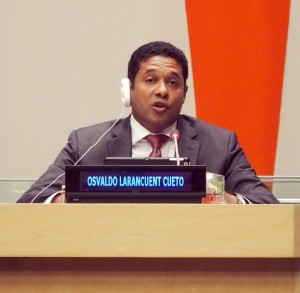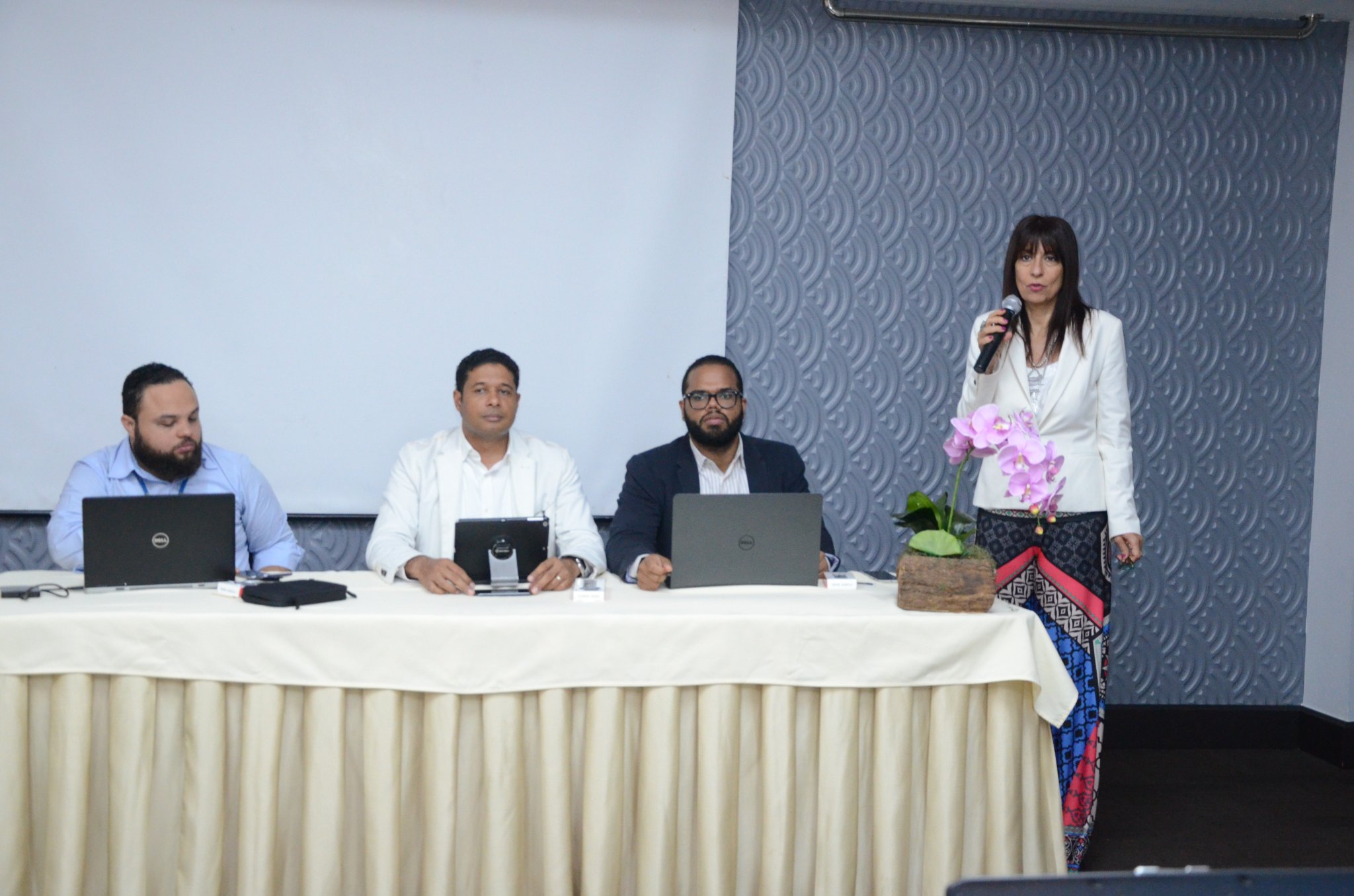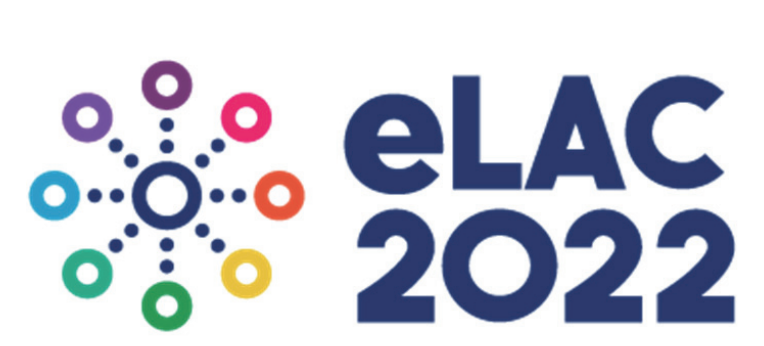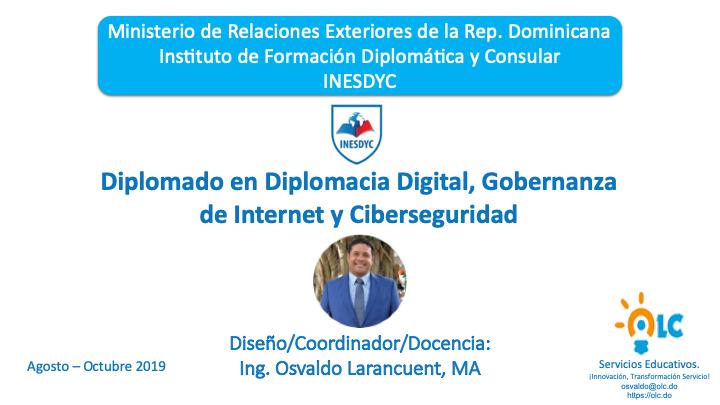October 19th, 2015. United Nations (UN). New York. Transcription of the keynote made by Mr. Osvaldo Larancuent, as an invited panelist of the discussion table organized by UN about the ICT for Development . As part of the agenda of the II Informal Consultations WSIS+10, held at the UN in New York.

First of all, I would like to take the chance thank the honor of United Nations for giving me this opportunity, as a professor of Information and Communications Technologies (ICT) from the academic sector in Dominican Republic; as well as a professional, a citizen, a father, and member of the Caribbean Region. Willing to contribute with society, to participate in this review process of the outcomes from the last ten years of the World Summit of Information Society celebrated in Tunis in 2005 (WSIS+10), where a plan of action was launched to promote the adoption of ICT, human centered, addressing the Sustainable Development Goals of all member states.
I salute all members of UN, all represented governments, civil society communities, colleagues, all stakeholders, present here part of chorus of voices interested in make the best out of this process to reduce digital divides, promote access, use, creation and sharing of information and knowledge.
Success of ICT for Development
ICT has succeeded as an enabling platform for Innovation and the creation of value. This value have contributed to leverage the Sustainable Development Goals, improving our lives, allowing people to produce ways out from povery,
Innovation based on ICT, have addressed the creation of value for business purposes, as well as to improve social environments.
Now more than ever we see the dynamics of change more vibrantly the creation of value based on innovation to improve trade, the services of governments on education, inclusion, participation of all stakeholders,
I think the international communities have achieved great success and have demonstrated the importance of ICTs as a human centered tool, to contribute the development of nations.
In no other time in the past, people have the opportunities to express themselves, to access information via Internet, to improve knowledge and capabilities, share free educational programs, and also being proactive users on the trends of a new wave of electronic services such as e-government, e-commerce, e-collaboration promote innovation, bancarization, and change in our societies.
We are seeing improvements in mobile devices, enabling people to access wirelessly Internet, allowing people communicate, interact, use available and learn from contents, or even produce it or work remotely is amazing. I think the goals to have everyone connected are rights, and we see it coming.
Fear for change
But we all know that people fear change, because of the uncertainty it creates. But we all are willing to accept change if it improves our quality of life, provides us new knowledge, new productive tools, new experiences. ICTs have the potential to promote growth and efficiencies, but they are tools, that needs knowledge, this is not a plug and play process.
We need more access for people to get inform and accessontents. People who access and demand that content, need also local contents in their languages. Civil Society needs more participation to collaborate in this process. We have seen social innovations and actions from civil societies to reduce waste, to redistribute food, to improve health, to create useful contents, with common actions, with impressive results, most of the time to show that we can change with collaboration; employing volunteers willing to help.
Also academies and the business sector are there, willing contribute innovation and to invest on new business models. For e-government, e-commerce and other emerging tools to succeed, you need citizens and customers to consume your services.
It is important to mention that economic limitations of different countries, prefer to see ICT as a luxury; specially when they face challenges on mitigation of poverty, nutrition, health, education. There is need to improve solidarity, to help them finance those programs, that will improve the quality of life of people, that may use the ICT skills to find new jobs, increase their opportunities.
Being involved in this process of change in my country, and being aware about what has happened in different locations tells me that willing government can improve our lives. The engagement of all governments, needs to improve and embrace not only the creation of public policies to enable a socioeconomic environment focused on improve business facilities; but also actions to reduce the digital gap, not only for people with economic restrictions, the youth, women and minorities within their countries, and people affected with impaired capabilities. Providing ways for them to feel included and improving their participation.
What have failed?
More access is needed, for people to connect; but also for them nurture from local digital content, to allow people to access information in their own language; about themselves, and with local government services to reduce the distance and resources gaps to receive them in a faster way. We need more demand, more bancarization, more ICT skills. And also more efforts to create an offer of quality.
I think more efforts are needed from governments and international communities, to improve reduce the digital gap, the quality of lives in their respective nations and not taking full advantages of ICT to contribute the achivement of the Sustainable Development Goals.
As we all know the civil society is composed by educated people, who know their rights; they want to contribute to improve changes in their lives, they want to be part of new opportunities, so governments have a great opportunity to continue reducing this collaboration gap.
It is true that public policies require political priorities and financing, but to work in a step-by-step process, in incremental ways, on a long term implementation strategy of society may benefit all.
Also academies and the business sector are there, willing contribute innovation and to invest on new business models. For e-government, e-commerce and other emerging tools to succeed, you need citizens and customers to consume your services.
It is important to mention that economic limitations of different countries, prefer to see ICT as a luxury; specially when they face challenges on mitigation of poverty, nutrition, health, education. There is need to improve solidarity, to help them finance those programs, that will improve the quality of life of people, that may use the ICT skills to find new jobs, increase their opportunities.
Which should be the priorities for future implementation?
Governance o collaboration, ICT capabilities and infrastructure, improving access and afordability to Internet, more improvement on human rights to be more inclusive, participative, and more creative ways for Financing the development.
The cost from public sector to improve education may be reduced using electronic content, using clean energy as solar; also new innovation on wireless technologies to improve reach. As less printed resources are needed. But not only focusing on students, also on the teaching skills of teachers, creating a learning to learn culture.
Politicians and governments are the natural leaders to need to embrace this vision, to leverage their plans using ICT to improve their opportunities to face the challenges. To embrace a long term strategic plan, to create a virtual cycle, with the collaboration of academia, civil society, business sectors.
To finance this goals, we need more commitment and collaboration from governments to improve the business environments, to improve their business sectors, to improve the infrastructures, to assure change is oriented to the creation of wealth. I mean if we need change, think the funding will be available if they embrace a vision of collaboration and business.
Coherence
I think it is important to assure that civil society, academy, business sectors are willing to engage in a virtual cycle on the short, medium and long term. Governments are in charge of leading the process; all stakeholders, who will benefit from improvements, and also will increase trade, knowledge, innovations and change.
How should all these be reflected in the outcome document?
I agree with the spirit of the Zero Draft, and we need to inspire the change of the state of minds from the different nations of the world. But we need to embrace the vision that we are all part of the equation, not only governments. The concept of governance, collaboration, human rights, democracy they are all based on principles, that promote change in people. ICT can improve change, academy, civil society, business sectors can contribute but they need to be included in ways that make sense for all.
We have seen social actions from civil societies to reduce waste, to redistribute food, to improve health, to create useful contents, with common actions, with impressive results, most of the time to show that we can change with collaboration; employing volunteers willing to help. Also academies and the business sector are there, willing contribute innovation and to invest on new business models.
Success of ICT for Development
ICT as an enabling platform for Innovation and the creation of value. This value can address the Sustainable Development Goals, improving our lives, allowing people to produce ways out from poverty.
Further info:
UN Report 2015 : Conceptual Note of the UN Pannel.
UN PR note 2015: Second Informal Interactive Stakeholder Consultation
UN Zero Draft WSIS+10 2015: Notes on OLarancuent Zero Draft




